新目标九年级英语复习资料
人教版新目标英语九年级各单元短语复习归纳
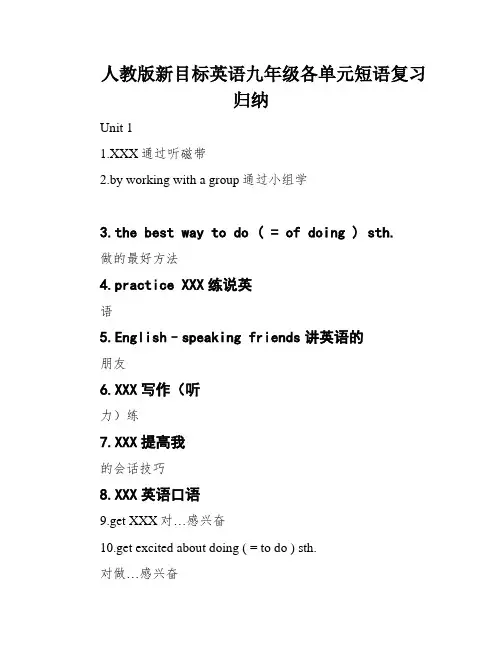
人教版新目标英语九年级各单元短语复习归纳Unit 11.XXX通过听磁带2.by working with a group通过小组学3.the best way to do ( = of doing ) sth.做的最好方法4.practice XXX练说英语5.English–speaking friends讲英语的朋友6.XXX写作(听力)练7.XXX提高我的会话技巧8.XXX英语口语9.get XXX对…感兴奋10.get excited about doing ( = to do ) sth.对做…感兴奋11.end up with sth.以…结束12.end up XXX截止做某事,结XXX做某事13.end up XXX以说汉语结束对话14.make mistakes in spelling ( grammar )在拼写(语法)方面出毛病15.how to use。
如何利用。
16.XXX畏惧或人/物17.be afraid to do害怕做,不敢做18.decide ( not ) to do sth。
= decide ondoing = make a XXX定(不)做19.XXX喜欢干…20.XXX建议做21.have trouble doing sth。
= haveproblems doing sth.= have a harddifficult ) XXX做。
有困难22.have fun XXX玩得高兴23.XXX忘记24.try ( = do ) one’s best to do sth.极力做25.with the help of sb。
= with sb.’s help XXX在…的匡助下26.( how ) deal with = ( what )do with对待,处理。
27.XXX担心,担忧28.give sb。
some ns = give sb.some advice给或人提发起29.write them down写下/记下它们30.look ( it。
九年级英语新目标unit1_复习课件
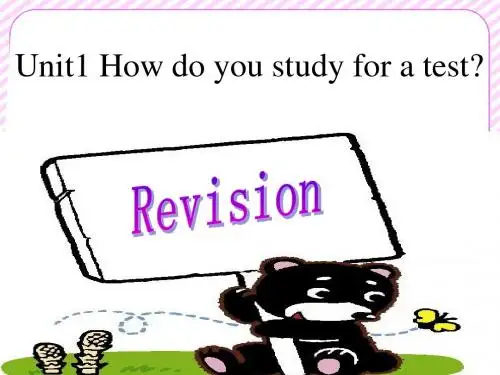
1.学习英语最好的方法 2.在小组内学习 3.通过听录音带 4.读教科书 5.制作词汇卡 6.看英语语言录像 7.朗读 8.练习发音 9.以那种方式学到很多 10. 太难以致不能听懂 发音.
1.将…变为… 3.在…的帮助下 4.考虑,想到 5.把…和…相比 8.中止,中断友谊 9.学会忘记 10. 更糟糕的事情
change…into… with the help of… think of… compare…with/to… break off a friendship learn to forget something worse
Unit 1 ┃ 基础知识梳理
10.尽力做……_______________best try one's 11.突然中止;中断______________ break off
12.参加小组学习________________ a study with
group 13.因……很兴奋(很激动)____________________ about sth. be/get excited 14.以……而告终________________ end up doing sth do/make a __ 15.做关于……的调查_________________survey 16.犯错误_make mistakes _______________ 17.在……方面有困难_________________________ have difficulty/trouble in doing st 18.写下;记下________________________ write down 19.把……看作 ________________ regard…as 20.在……的帮助下____________________ of with the help
新目标九年级英语总复习资料
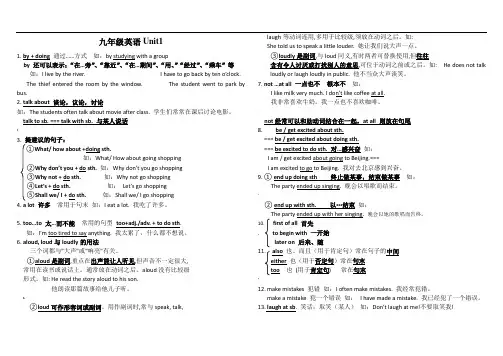
九年级英语Unit11. by + doing通过……方式如:by studying with a groupby 还可以表示:“在…旁”、“靠近”、“在…期间”、“用、”“经过”、“乘车”等如:I live by the river. I have to go back by ten o’clock.The thief entered the room by the window. The student went to park by bus.2. talk about 谈论,议论,讨论如:The students often talk about movie after class. 学生们常常在课后讨论电影。
talk to sb. === talk with sb. 与某人说话$3. 提建议的句子:①What/ how about +doing sth.如:What/ How about going shopping②Why don’t you + do sth.如:Why don’t you go shopping③Why not + do sth. 如:Why not go shopping④Let’s + do sth. 如:Let’s go shopping⑤Shall we/ I + do sth.如:Shall we/ I go shopping4. a lot 许多常用于句末如:I eat a lot. 我吃了许多。
,5. too…to 太…而不能常用的句型too+adj./adv. + to do sth.如:I’m too tired to say anything. 我太累了,什么都不想说。
6. aloud, loud与loudly的用法三个词都与"大声"或"响亮"有关。
①aloud是副词,重点在出声能让人听见,但声音不一定很大,常用在读书或说话上。
2023年人教版新目标英语九年级全册单元知识点及配套练习
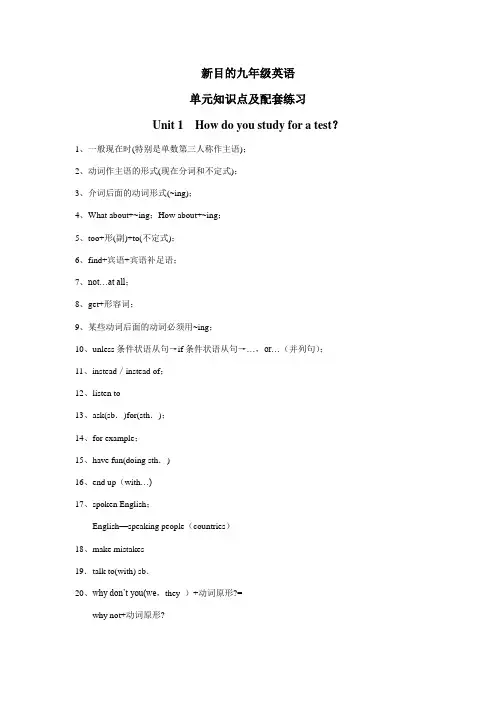
新目的九年级英语单元知识点及配套练习Unit 1 How do you study for a test?1、一般现在时(特别是单数第三人称作主语);2、动词作主语的形式(现在分词和不定式);3、介词后面的动词形式(~ing);4、What about+~ing;How about+~ing;5、too+形(副)+to(不定式);6、find+宾语+宾语补足语;7、not…at all;8、get+形容词;9、某些动词后面的动词必须用~ing;10、unless条件状语从句→if条件状语从句→…,or…(并列句);11、instead/instead of;12、listen to13、ask(sb.)for(sth.);14、for example;15、have fun(doing sth.)16、end up(with…)17、spoken English;English—speaking people(countries)18、make mistakes19.talk to(with) sb.20、why don’t you(we,they )+动词原形?=why not+动词原形?21、laugh at22、first of all23、to begin with.24、later on25、be afraid of sth.(doing)be afraid to do sth.be afraid that从句26、in class/out of class /after class27、take notes28、get an“A”in English29、(sb.)be impressed by(wi th)…30、have trouble doing sth.(回见15)31、look up32、make up a conversation.33、around the world.34、deal with35、stay(keep)+形容词36、go by37、decide(not)to do sth.38、主语+last(延续) for long39、regard sb.(sth.)as…/hink of sb.(sth.)as…40、complain about sth.41、compare sth to sth.(把…比作…);compare sth with sth.(把…与…进行比较)42、physical problems43、break off44、in a positive way45、study for a test46、learn a lot (in)that way47、keep an English notebook48、区别:sound,voice,noise49、区别:loud,aloud,loudly50、find sb./sth.+宾语补足语;find it +宾语补足语+(for sb.)to do sth.51、try one's best (to do sth.)52、with the help=with one's help53、much too 与too much练习:1.Everyone ______(want)to study English well.2.______(listen) to English every day ______ (help) him a lot.3.How about ______ (be) a musician?That's great!4.The stone looks too big for her to move.(1)译成汉语;(2)用so…that…改写。
人教新目标版英语九年级全册必背单词、短语、句型(期末复习提纲)
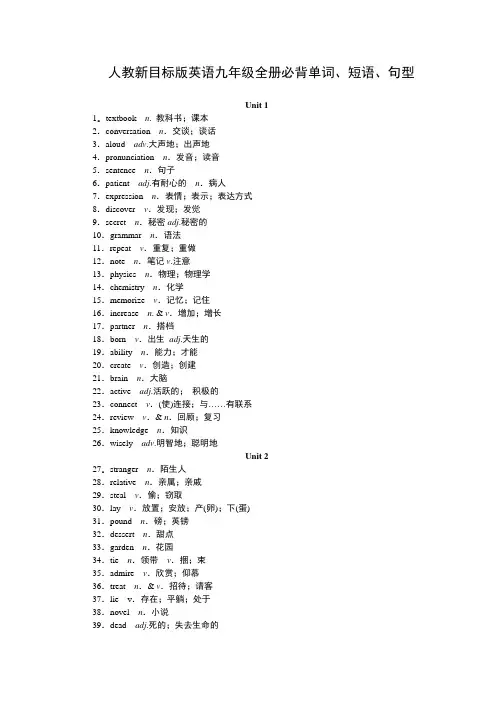
人教新目标版英语九年级全册必背单词、短语、句型Unit 11.textbook n. 教科书;课本2.conversation n.交谈;谈话3.aloud adv.大声地;出声地4.pronunciation n.发音;读音5.sentence n.句子6.patient adj.有耐心的n.病人7.expression n.表情;表示;表达方式8.discover v.发现;发觉9.secret n.秘密adj.秘密的10.grammar n.语法11.repeat v.重复;重做12.note n.笔记v.注意13.physics n.物理;物理学14.chemistry n.化学15.memorize v.记忆;记住16.increase n. & v.增加;增长17.partner n.搭档18.born v.出生adj.天生的19.ability n.能力;才能20.create v.创造;创建21.brain n.大脑22.active adj.活跃的;积极的23.connect v.(使)连接;与……有联系24.review v.& n.回顾;复习25.knowledge n.知识26.wisely adv.明智地;聪明地Unit 227.stranger n.陌生人28.relative n.亲属;亲戚29.steal v.偷;窃取30.lay v.放置;安放;产(卵);下(蛋)31.pound n.磅;英镑32.dessert n.甜点33.garden n.花园34.tie n.领带v.捆;束35.admire v.欣赏;仰慕36.treat n.& v.招待;请客37.lie v.存在;平躺;处于38.novel n.小说39.dead adj.死的;失去生命的40.business n.生意;商业41.punish v.处罚;惩罚42.warn v.警告;告诫43.present n.现在;礼物adj.现在的44.warmth n.温暖;暖和45.spread v.传播;展开n.蔓延;传播重点短语1.pay attention to注意;关注2.connect ... with把……和……联系起来3.take notes做笔记4.have a conversation谈话5.be born with天生具有6.put on (weight)增加(体重)7.lay out展开;布置8.be similar to与……相似9.end up最终成为;最后处于10.trick or treat不招待就使坏11.Christmas Eve圣诞节前夕12.dress up盛装打扮13.not only... but also...不仅……还……14.read aloud大声读必背句型1.What about listening to tapes?听磁带怎么样?2.It's too hard to understand spoken English.理解英语口语太难了。
新目标九年级英语单元复习资料
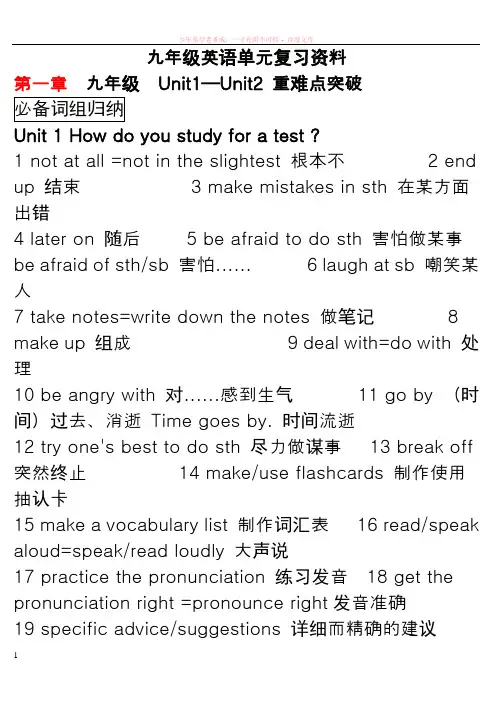
九年级英语单元复习资料第一章九年级Unit1—Unit2 重难点突破Unit 1 How do you study for a test ?1 not at all =not in the slightest 根本不2 end up出错嘲笑某人8处理(时间)突然抽认15 make a vocabulary list 制作词汇表16 read/speak aloud=speak/read loudly 大声说17 practice the pronunciation 练习发音18 get the pronunciation right =pronounce right发音准确19 specific advice/suggestions 详细而精确的建议20 memorize/recite the words/text 背书21 read the textbook 读课本22 English grammars 英语语法23 feel differently 觉的不同24 frustrate sb = make sb frustrated 使某人沮丧find sth frustrating 发现某事沮丧参加英语31被某人难为工作37 listen to tapes 听磁带listen to the teacher carefully 认真听课38 ask sb for help 寻求帮助ask sb to do sth 叫某人做某事tell sb about sth 告诉某人某事39 improve my listening/speaking skills 提高听力/口语技巧40 enlarge the vocabulary 扩大词汇量41 watch English news 看英语新闻43 keep a diary in English 用英语写日记44 review notes 复习笔记45 write original sentences 写新颖的句子46It's变angry 持续生气60 solve the problem 解决问题61 change problems/troubles/difficulty into challenge 把困难变成挑战62 realize sth =sth come true 实现某事63 make a complete sentence 造一个完整的句子64 complete/finish doing sth 结束做某事65 the secret of sth ...的秘密66 an important part of sth. 最重要的一部分67 find a pen pal 找一个笔友way75帮80 too much + n. 太多... much too + adj. 太……75 last for a long time 持续很长时间Unit2 I used to be afraid of dark .1 used to 过去常常2 be interested in =take an interest in 对...感兴趣3 be afraid of=beterrified of 害怕4 go to sleep with the light on 开着灯睡觉5 eat candy [U] 吃糖6 chew gum [U] 嚼口香糖7 chat with sb=have a chat with sb 与...聊天8每天死./临终sb1518. head master 校长monitor 班长19 to one's surprise 使某人吃惊be surprised at sth 吃惊于 (20)even though=even if 即使21 no longer=not...any longer 不再(延续性) nomore=not...any more 不再(短暂性) 22 take pridein=feel/be proud of 为...而自豪23 pay attention to sth/the grammar 注意语法24 give up 放弃25 a couple of days 两天26 have a good memory 记性很好27 look different 看起来不同look the same 看起来一样浪30time36独40 walk to school=get to school on foot 走路去学校take a bus=go by bus=go on a bus 乘车ride abike=go by bike=riding 骑车41 a six-year-old brother 一个6岁的弟弟42 spend time (in) doing sth 花时间做某事43 take sb to aconcert 带某人去音乐会44 hardly ever 几乎不45 change a lot 改变了许多46 in the last few years 近几年47 can't stop doing 忍不住做某事48 problem child 问题小孩49 give sb sth 给某人某物as地点。
英语中考复习新目标九年级 Units 1-2
1. aloud aloud, loud和loudly
26. _____________________ 小菜一碟。
give sb. a treat 27. _____________________ 你活该。
28. _____________________ 用英语记日记
improve reading speed / speaking skills
It’s a piece of cake.
bit by bit body language
10. ______________ 叫出 / 喊出
call out 11. ______________ connect ... with… 把……和……连接 / 联系起来
12. ______________ 圣诞节
13. ______________ 平安夜
It serves you right. keep a diary in English
Knowledge comes from questioning. 29. ________________________________ 知识源于质疑。
30. _____________ 摆开;布置
31. _____________ 学习习惯
42. ________________ 独自
(完整版)人教版新目标九年级全册英语复习资料
九年全册英复料◆unit1 How do you study for a test?一.复重点1.目言: talk about how to study,2.要求背部分P3G , P4-3a, P6-3a,P8-reading3.背表。
4.复教材所有内容,复所做的,侧重基目。
二.知点:1. frustrate,frustrating,frustrated:frustrate 意思“使绝望,使沮,使”,是及物,后来接;frustrating意思“令人沮的,令人绝望的”。
是指某事令人绝望,含有主意,主一般物;frustrated 意思“沮的,绝望的”。
是指某物感觉绝望,相当于disappointed, 含有被意,主一般人。
短 be frustrated in 意思“遭到失”。
2.介 by , with, in , on 表方式 : by+ 交通工具(注意不冠),by+doing sth 通⋯方式; with+ 工具, with a pen, with+ 人体部位,with our eyes ;in + 言,in English,in+ 物资料, in ink (墨水) =by pen ;on+器或媒介 on TV3. Ever 的用法: ever 相当于 at any time ,意思“曾”。
同 always, 反never.常于在达成的一般疑句及条件状从句,其余状况下也有所使用。
1)用于在达成的一般疑句中。
Haveyou ever been to Shanghai? 2 )用于条件状从句。
If you ever hear from her, please tellme about it.3) 用于一般在的疑句中。
Doyou ever talk to your English friends?4) 用于否定句。
No man ever returned from here.5 )用于必定句中,表示“经常,是” ,常使用always. 注意: ever 和 always 的反都是never。
人教版新目标英语九年级各单元短语复习归纳
人教九年级各单元短语复习归纳Unit 11.by listening to tapes 通过听磁带2.by working with a group通过小组学习3.the best way to do ( = of doing ) sth、做的最好方法4.practice speaking English练习说英语5.English – speaking friends讲英语的朋友6.writing / listening practice写作(听力)练习7.improve my speaking skills 提高我的会话技巧8.spoken English 英语口语9.get excited about sth 对…感兴奋、对做…感兴奋10.get excited about doing ( = to do ) sth11.end up with sth、以…结束12.end up doing sth、终止做某事,结束做某事13.end up speaking in Chinese 以说汉语结束对话14.make mistakes in spelling ( grammar )在拼写(语法)方面犯错误15.how to use 、、、、怎样使用、、、、16.be afraid of sb、/ sth、害怕某人/物17.be afraid to do 害怕做,不敢做18.decide ( not ) to do sth、= decide on doing、= make a decision to do sth决定(不)做19.enjoy doing 喜欢干…20.suggest doing sth、建议做、做、、、、、= have a hard ( difficult ) time doing sth21.have trouble doing sth、= have problems doing sth有困难22.have fun doing sth 玩得高兴23.learn to forget 学会忘记24.try ( = do ) one’s best to do sth、尽力做25.with the help of sb、= with sb、’s help在…的帮助下26.( how ) deal with = ( what )do with 对待,处理,27.worry about = be worried about 担心,担忧、some advice 给某人提建议28.give sb、some suggestions = give sb29.write them down写下/记下它们30.look ( it, them ) up in a dictionary查字典31.be angry with sb、= be mad at sb、= be annoyed with sb、生某人的气32.be angry at / about sth、对某事生气与朋友对话33.have conversations with friends34.make flashcards 做单词抽认卡35.make vocabulary lists 做单词表36.ask…for help 向某人求助37.study for a test 为考试作准备38.that way (=in that way) 通过那种方式39.too …to… 太…而以致于不能做40.read aloud 朗读41.learn a lot 学到许多42.help a little 有点帮助43.not …at all 根本不,全然不44.ask sb、about sth 、问某人关于、、、、的事45.feel differently 感受不同与、、、、不同46.be different from = be not the same as47.the difference between A and B A与B的区别48.get lots of ( = much ) practice得到大量的练习49.get the pronunciation right 使发音准确50.join an English language club加入英语俱乐部51.first at all 首先52.to begin with ( = at first ) 开始53.in class 在课堂上ter on 随后ugh at 嘲笑56.make complete sentences with用、、、、造完整的句子57.take notes 记笔记58.this kind of paper 这种纸59.feel soft 摸起来柔软60.around the world = all over the world 全世界61.make up 编造,虚构,化妆,打扮62.speak English as a second language把英语当做第二语言来说63.go by 消逝把…当做…64.regard sb、/ sth、as = have / take… as = think of… as把困难当作挑战65.regard problems as challenges66.solve a problem解决困难plain about / of sb、/ sth、to sb、向某人抱怨68.change sth、into 把…变为…pare A with / to B 把…与…作比较70.think of 想起,想到71.break off friendships 中断,突然终止友谊Unit 2ed to do 过去常常2.be used to doing … 习惯于作3.be used to do 被用来作4.wear glasses 戴眼镜5.wait a minute 等一等更加)注意6.pay ( more )attention to sth、( doing sth、)对…(7.give up doing = stop doing 放弃做…8.instead of ( doing ) … 代替, 而不就是9.be interested in doing= take ( an ) interest in doing 对…感兴趣10.lose interest in 对…失去兴趣11.on the swim team = be a member of the swim team 游泳队的队员、12.be afraid ( terrified ) of doing sth、惧怕做13.be terrified of sth、/ sb、=be afraid of 惧怕某人/ 物…14.go to sleep = fall asleep 入睡15.all the time = always 一直,总就是16.play + 球类名词/ 棋类17.play the +乐器(piano ) 弹(钢琴)18.play with 玩耍,与一起玩19.with the lights on 开着灯…、20.with the door open ( closed ) 开(关)着门21.walk to school = go to school on foot 步行去上学坐公车去上学22.take the bus to school = go to school by bus23.spend time doing= take time to do 花时间做… 24.speak in front of a group 在人群面前讲话25.take sb、to concerts 带某人去音乐会26.go right home 直接回家27.be alone 单独28.daily life 日常生活29.chat with sb、about sth与…聊关于…30.in the last ( past ) few years 过去的几年里(用于现在完成时)31.make you stressed out使您紧张32.look after… well= take good care of …照顾… 好33.watch …on TV在电视上瞧…34.all day (long) = the whole day 整天35.as +原级+ as sb、can / could =as+原级+ as possible 尽可能…地36.in the end = at last = finally最后,终于37.talk with 与…谈论38.to one’s surprise令某人吃惊的就是39.in surprise 吃惊地40.even though = even if 尽管不再41.no longer = not… any longer不再42.no more=not… any more43.take pride in = be proud of 对…感到自豪44.the pride of 就是…的骄傲45.change one’s life 改变某人的生活46.change one’s mind 改变某人的主意47.an eight-year-old boy一个八岁的男孩子48.problem child 问题少年在几年前她爸死后49.after his father's death a few years ago50.can /can't afford to bu y …能/不能买得起…51.be patient with 对…有耐心52.cause trouble to sb、给… 惹麻烦53.get into trouble 遇到麻烦54.get into trouble with 与…引起冲突、55.be in trouble 处于困境中56.waste time (money)浪费时间57.be able to = can 能够58.It is necessary to do… 做…就是必要的Unit 31.allow sb to do sth允许某人做某事2.allow doing 允许做某事3.be allowed to do被允许做某事4.should be allowed to do应该被允许做某事5.get sb、to do sth、让某人做(主动)、请某人做, 让…被做(被动) 6.get / have / make sth、done = ask someone to do sth7.stop doing sth 停止做某事8.need to do sth需要做某事(主动)需要被做(被动)9.need doing = need to be done10.instead of (doing sth)代替、不就是11.be serious about sth、/ doing sth、对……认真对……热衷12.get / be in the way of妨碍……13.reply to sb、= answer sb、回答、答复14.have an opportunity to do / of doing sth、有机会做某事、有机会做某事15.have a chance to do /of doing sth16.would(’d) like to do= want to do= feel like doing想要、希望……17.at present = now = right now 目前、现在18.concentrate on… 集中精力于……前几天(用于过去时)19.the other day = a few days ago20.sixteen-year-olds16岁的青少年21.have part-time jobs做兼职工作扎耳洞22.get one’s ears pierced23.not serious enough 不够认真驾驶执照24.driver’s license25.so do we 我们也一样26.get to class late= be late for class 上课迟到27.at times = sometimes 有时28.on school nights/Friday nights在上学日子里的晚上/星期五晚上29.by 10:00 am 上午10点前30.stay up to do / doing 熬夜31.clean up 清扫干净32.fail a test 测试不及格33.take the test 参加考试34.pass the test 通过考试35.be strict with sb对某人要求严格36.be strict in sth对某事要求严格37.be good for ( doing )对…有好处38.be good to sb、对…好39.be good at doing= do well in doing= do …well 擅长于……40.a good idea/way to do sth、做…的好方法41.learn from向…学习/ 从…学到……42.study in groups 分组学习43.look good/nice on sb、穿在某人身上好瞧44.eight hours’ sleep a night每晚八小时的睡眠45.at least 至少<—> at most 至多46.have / take +时间+off休息多长时间47.get noisy 变得嘈杂、对…来说就是很有意义的经历48.be a good experience for sb49.a running star 一个跑步明星50.the importance of working hard 努力工作的重要性51.as much as 与……一样多52.care about 在意,担心,关心53.care for 喜欢,照顾实现梦想54.achieve/realize one’s dream55.spend on sth / in (doing) sth花费…56.take time to do sth、花时间做某事57.an English-English dictionary英语词典58.old people’s home 敬老院59.choose my own clothes 挑选我自己的衣服60.learn a lot from each other 相互学到很多知识61.feel sleepy 感到困倦62.chat with friends online网上与朋友聊天63.in fact 事实上64.at that age 在那个年龄65.now that 既然66.very few people 极少数人Unit 4、在做某事方面有经验1.have experience (in) doing sth2.without doing sth、未做3.before doing sth、在做…之前4.would rather…than… = would do rather than do= prefer to do rather than do= prefer doing to doing宁愿… 也不愿…5.refuse to do sth、拒绝做某事6.wait for sb、to do sth、等某人做7.be easy to get along with容易相处e up with = think of= think up提出、想出e up with = catch up with sb、追上赶上10.by accident = by chance偶然地、无意之中11.worry about = be / feel worried about 担心,忧虑12.not …in the slightest一点也不= not …at all足够的…13.plenty of = a lot of = lots of = many/ much 许多…,14.more than = over 超过,多于15.hurry to do sth、= do sth、in a hurry 匆忙做16.hurry up = come on 赶快,快点17.offer sth、to sb、= offer sb、sth、主动给某人某物18.offer to do sth、主动做19.right away = at once= in a minute = in no time立即,马上20.give a speech in front of ( = whole ) the school在全校面前作演讲未经允许21.without ( one’s ) permission22.with ( one’s ) permission在某人许可的情况下23.ask one’s permission请求某人的允许24.give advice on 就某方面提出建议25.the danger of smoking吸烟的危害26.be in (out of ) danger处于(脱离)危险27.be out of danger 脱离危险28.be dangerous to do sth、做…有危险29. a million dollars 一百万美元30.buy snacks 买零食31.three hundred / thousand / million / billion三百/千/百万/十亿32.hundreds / thousands / millions / billions of 数以百/千/百万/十亿计33.give the money to charity把钱捐献给慈善机构34.put the money in the bank把钱存入银行35.medical research 医疗研究36.research on sth、在某方面的研究37.at the party 在晚会上38.wear a shirt and tie穿衬衣打领带39.what if +一般现在时如果…会怎么样呢?40.everyone else 其它任何人41.get / be nervous 紧张42.look friendly 瞧起来友好43.get pimples起鸡皮疙瘩/长青春痘44.take a big exam 参加大考45.take a long walk 散一大段步46.help you relax 帮您放松47.let me have one 让我有一个48.speak in public= speak in a public place在公共场合49.hardly ever 几乎不曾50.ask sb、to be in a movie邀请某人拍电影51.introduce oneself to sb、向sb做自我介绍52.be pretty confident 相当自信53.a circle of good friends好友圈、54.say something bad about sb 说某人的坏话55.the company of ………的陪伴56.English speech contest英语演讲比赛57.represent the classin the school contest代表班级参加学校的比赛58.let sb、down 使某人失望59.the rest of the students其余的学生60.the answer to the question问题的答案61.solutions to problems问题的解决方法e out 出来、出版、开花63.cover A with B用A覆盖住 B64.be covered with 被……覆盖65.go downstairs / upstairs下/上楼66.running water 自来水67.get hurt 受伤68.an internet friend 一个网友69.go alone 单独去70.ask sb、for advice向某人寻求建议Unit 51.belong to sb、= be sb、’s属于2.because of n、/pron、因为3.be afraid of flying 害怕坐飞机4.try ( not ) to do sth、尽力(不)做某事5.attempt to do = try to do sth、试图做, 尽力做6.have fun doing 做…愉快7.sth happen to sb某人发生了某事8.sb、happen to do sth = do sth、by accident 某人碰巧作某事假装做;9.pretend to do sth=pretend that…10.pretend ( not ) to do sth 假装( 不) 做;11.pretend to be doing sth假装正在做…12.be careful of sb、/ sth、留神、当心…13.be careful ( not ) to do小心(不) 做知道14.have some / any idea = know15.have no idea = don’t know =have no idea of不知道奇怪的东西16.strange things = something / anything strange17.sb、use up sth、= sb、run out of sth、= sth、run out sb用光、用完sth18.too much + u、n 太多too many + pl、太多19.much too + adj、/ adv、太20.get on ( it ) 上(公共汽车,飞机等)21.get off ( it ) 下(公共汽车,飞机等)22.get into / out of ( it ) 上/下( 小汽车,出租车)23.smell good / bad 闻起来香/不好24.make me laugh / happy 使我发笑/高兴25.listen to classical music 听古典音乐26.go to the concert 去听音乐会27.all alone = all by oneself 独自28.a present for his mother送给她妈妈的礼物29.run for exercise 跑步锻炼30.run to catch a bus 跑去赶车31.the final exam 期末考试32.wear a suit 穿西装33.call the police 报警34.an ocean of paper 题海35.the owner of …的主人36.these days最近,近来,近几天(用于现在进行时,现在完成时)37.Chinese-English Dictionary汉英词典38.Oxford University牛津大学39.the only kid at the picnic 野餐上唯一的孩子40.go for a picnic 去野餐41.have a picnic进行野餐42.in the sky 在空中43.a woman with a camera 一个带着相机的妇女44.make up 形成,构成,组成45.outside our window在窗子外面46.escape from=run away from逃离,从…逃出47.hair band 发带48.make a movie拍电影49.in our neighborhood在我们附近、在我们小区50.get in the window 从窗户过来51.next door neighbor 隔壁邻居52.in one’s dream 在某人梦中53.It’s crucial that 关键的就是…Unit 61.sing along with 伴随……歌唱2.dance to the music 随音乐……跳舞3.on a hot day 在热天4.prefer sth、= like sth、better 更喜欢5.prefer sth、to sth、= like sth、better than sth、喜欢……胜过……6.prefer to do sth、更喜欢做7.prefer to do rather than do 宁愿做…而不愿做8.prefer doing to doing 喜欢做…胜过做9.expect to do sth、期望干…… 10.expect sb、to do sth 期望某人干…11.catch up with 追上,赶上12.different kinds of music各种不同的音乐13.quiet and gentle songs 轻柔的歌曲带……到……去14.take…to… 使某人想起或意识到…… 15.remind sb、of … 16.remind sb to do sth 提醒某人做某事17.be well- known as 作为…而闻名18.be well- known for 由于…而闻名19.be well- known to sb 为…所熟知20.write their own songs 写她们自己的歌曲21.be important to sb、对某人来说重要22.interest sb、引起…的关注,使感…兴趣23.Yellow River 黄河某人最近的电影24.one’s latest movie与……一样25.as…as… 26.over the years 多年来,在近几年中(往往与现在完成时连用)27.whatever = no matter what 无论什么28.be sure of +n、/ pron、相信,对……有把握29.be sure that 从句相信,对……有把握30.be sure to do sth、= make sure to do 务必干……一定干……31.make sure 确保,核实,查收,弄清楚32.one of the+最高级+复数名词,最……之一世界上最有名的中国摄影家之一33.one of the best- known Chinese photographers34.the name of ……的名字35.on display = on show 展览,展出36.go on vacation 去度假e and go 来来往往38.can’t stand 不能忍受39.look for 寻找40.feel sick 感到恶心,不舒服41.stay / keep healthy 保持健康42.be healthy= be in good health健康43.take care of my health爱护我的健康44.get together to do 聚在一起做45.special events 特殊事件玩得高兴,过得愉快46.have a great time = have fun = enjoy oneself47.to be honest 老实说48.an honest boy一个诚实的男孩49.my six-month English course我6个月的英语课培训50.be lucky to do做……就是幸运的51.a good place to visit 一个游览的好地方52.suit me just fine 刚好适合我53.increase the risk of cancer增加患癌症的风险54.most of my friends 我的大部分朋友55.French fries 薯条56.stay away from与……保持距离,离开,不接近57.be in agreement意见一致(后跟短语、句子)58.in the world 在世界上59.barbecued meat烤肉60.a tag question反意疑问句61.be bad for对……有害62.even if / though 即使Unit 71.would like(love)to do = want to do sth、= feel like doing 想做某事2.would like sb、to do sth、3.hope for +n、盼望sth4.hope to do / hope that 希望……5.plan on doing = plan to do 打算做某事6.continue doing sth、= continue to do sth、= go on doing sth、继续做决定做p one’s mind to do7.decide ( not ) to do = decide on doing = make a decision to do = make u8.decide not to do 决定不做9.consider doing 考虑做10.consider something /sb 考虑sb/sth11.consider sb to be---/consider sb as--- 把某人瞧作……12.after finishing school 毕业之后13.be supposed to do sth、= should do sth、应该干14.be convenient to do sth、做---很方便15.be willing to do sth、愿意干16.be ready to do sth、准备好去做……、sth、= offer sth、to sb、为某人提供---17.provide sb with sth = provide sth for sb = offer sb18.so that + 句子= in order that+句子= in order to do = so as to do = to do 为了---, 以便---通常,大体上, 一般而言19.in general = generally speaking。
中考新目标九年级英语全册复习资料
中考新目标九年级英语全册复习资料该资料适合本期期末及下期中考复习使用内容包括:短语,句型,语法,语法专题练习一、复习指导1、范围:Unit 1-11单元约占35% 其余65%属于7/8年级基础。
请务必复习7/8年级词汇。
2、重点复习:1)词汇:黑体字(四会词)要求能认读写用,其它要求能认读即可。
2)短语、句型:熟读各单元短语,要求能认,重点短语要求能运用3)语法:各单元Grammar Focus 及教材P150-153(在单选题里考察)只要求掌握教材出现的基本用法即可,其它不必拓宽。
复习时应该遵循少讲多练,每项语法应该进行专题训练,题不能多,5-10个(改错、单选,填空)重点训练常考常错题,让基础知识过关过手。
4)词形复习:应对单词拼写,短文填空及书面表达题做好名词复数,动词三单,过去式,不规则动词,形容词比较级最高级,以及构词法词缀复习练习。
5)课文:各单元重点Section A3、题型:中考题型即县单元题:见第6,7套模拟题4、加强对各题型答题指导方法,做好模拟训练。
二、短语:Unit 1 How can we become good learners?work with friends 和朋友一起学习make word cards 制作单词卡study for a test备考ask sb for help向某人求助read aloud大声朗读speaking skill口语技能spoken English 英语口语look up 查阅give a report作报告word by word一字字地fall in love with 爱上make mistakes 犯错误depend on依靠in common共有的connect …with…把….和…..相连接think about考虑even if 即使pay attention to 注意take notes记笔记worry about 担心be born with 天生具有be interested in 对…感兴趣get/be/feel bored 感到无聊It takes time.这得慢慢来。
- 1、下载文档前请自行甄别文档内容的完整性,平台不提供额外的编辑、内容补充、找答案等附加服务。
- 2、"仅部分预览"的文档,不可在线预览部分如存在完整性等问题,可反馈申请退款(可完整预览的文档不适用该条件!)。
- 3、如文档侵犯您的权益,请联系客服反馈,我们会尽快为您处理(人工客服工作时间:9:00-18:30)。
九年级英语复习资料九年级英语Unit11.by+doing通过……方式如:by studying with a groupby还可以表示:“在…旁”、“靠近”、“在…期间”、“用、”“经过”、“乘车”等如:I live by the river.I have to go back by ten o’clock.The thief entered the room by the window.The student went to park by bus.2.talk about谈论,议论,讨论如:The students often talk about movie after class.学生们常常在课后讨论电影。
talk to sb.===talk with sb.与某人说话3.提建议的句子:①What/how about+doing sth.?如:What/How about going shopping?②Why don’t you+d o sth.?如:Why don’t you go shopping?③Why not+do sth.?如:Why not go shopping?④Let’s+do sth.如:Let’s go shopping⑤Shall we/I+do sth.?如:Shall we/I go shopping?4.a lot许多常用于句末如:I eat a lot.我吃了许多。
5.too…to太…而不能常用的句型too+adj./adv.+to do sth.如:I’m too tired to say anything.我太累了,什么都不想说。
6.aloud,loud与loudly的用法三个词都与"大声"或"响亮"有关。
①aloud是副词,重点在出声能让人听见,但声音不一定很大,常用在读书或说话上。
通常放在动词之后。
aloud 没有比较级形式。
如:He read the story aloud to his son.他朗读那篇故事给他儿子听。
②loud可作形容词或副词。
用作副词时,常与speak,talk,laugh等动词连用,多用于比较级,须放在动词之后。
如:She told us to speak a little louder.她让我们说大声一点。
③loudly是副词,与loud同义,有时两者可替换使用,但往往含有令人讨厌或打扰别人的意思,可位于动词之前或之后。
如:He does not talk loudly or laugh loudly in public.他不当众大声谈笑。
7.not…at all“一点也不根本不”,not经常可以和助动词结合在一起,at all则放在句尾如:I like milk very much.I don’t like coffee at all.我非常喜欢牛奶。
我一点也不喜欢咖啡。
8.be/get excited about sth.=be/get excited about doing sth.=be excited to do sth.对…感兴奋如:I am/get excited about going to Beijing.=I am excited to go to Beijing.我对去北京感到兴奋。
9.①end up doing sth终止做某事,结束做某事如:The party ended up singing.晚会以唱歌而结束。
②end up with sth.以…结束如:The party ended up with her singing.晚会以她的歌唱而告终。
10.first of all首先.to begin with一开始later on后来、随11.also也、而且(用于肯定句)常在句子的中间either也(用于否定句)常在句末too也(用于肯定句)常在句末12.make mistakes犯错如:I often make mistakes.我经常犯错。
make a mistake犯一个错误如:I have made a mistake.我已经犯了一个错误。
ugh at sb.笑话;取笑(某人)如:Don’t laugh at me!不要取笑我!14.take notes做笔记,做记录15.enjoy doing sth.喜欢做…乐意做…She enjoys playing football.她喜欢踢足球。
enjoy oneself过得愉快如:He enjoyed himself.他过得愉快。
16.native speaker说本族语的人17.make up组成、构成18.one of+(the+形容词比较级)+名词复数形式…其中之一如:She is one of the most popular teachers.她是最受欢迎的教师之一。
19.It’s+形容词+(for sb.)to do sth.(对于某人来说)做某事…如:It’s difficult(for me)to study English.对于我来说学习英语太难了。
句中的it是形式主语,真正的主语是to study English20.practice doing练习做某事如:She often practice speaking English.她经常练习说英语。
21.decide to do sth.决定做某事如:LiLei has decided to go to BeiJing.李雷已经决定去北京。
22.unless假如不,除非引导条件状语从句如:You will fail unless you work hard..假如你不努力你会失败。
I won’t write unless he writes first.除非他先写要不我不写23.deal with处理如:I dealt with a lot of problem.24.worry about sb./sth.担心某人/某事如:Mother worried about his son just now.妈妈刚才担心他的儿子。
25.be angry with sb.对某人生气如:I was angry with her.我对她生气。
26.perhaps=maybe也许27.go by(时间)过去如:Two years went by.两年过去了。
28.see sb./sth.doing看见某人正在做某事强调正在发生see sb./sth.do看见某人在做某事如:She saw him drawing a picture in the classroom.她看见他正在教室里画画。
29.each other彼此30.regard…as…把…看作为….如:The boys regarded Anna as a fool.这些男孩把安娜看成傻瓜。
31.too many许多修饰可数名词如:too many girlstoo much许多修饰不可数名词如:too much milkmuch too太修饰形容词如:much too beautiful32.change…into…将…变为…如:The magician changed the pen into a book.这个魔术师将这本书变为一本书。
33.with the help of sb.=with one’s help在某人的帮助下如:with the help of LiLei=with LiLei’s help在李雷的帮助下pare…to…把…与…相比如:Compare you to Anna,you are lucky.你和安娜相比,你是幸运的。
35.instead代替用在句末,副词(字面上常不译出来)instead of sth./doing sth.代替,而不是用在句中,动词如:Last summer I went to Beijing.This year I’m going to Shanghai instead.去年夏天我去北京,今年我将要去上海。
I will go instead of you.我将代替你去。
He stayed at home instead of going swimming.他呆在家里而不是去游泳。
九年级英语Unit2ed to do sth.过去常常做某事,否定形式:didn’t use to do sth./used not to do sth.如:He used to play football after school.放学后他过去常常踢足球。
Did he use to play football?Yes,I did.No,I didn’t.He didn’t use to smoke.他过去不吸烟。
2.反意疑问句①肯定陈述句+否定提问如:Lily is a student,isn’t she?Lily will go to China,won’t she?②否定陈述句+肯定提问如:She doesn’t come from China,does she?You haven’t finished homework,have you?③提问部分用代词而不用名词Lily is a student,isn’t she?④陈述句中含有否定意义的词,如:little,few,never,nothing,hardly等。
其反意疑问句用肯定式。
如:He knows little English,does he?他一点也不懂英语,不是吗?They hardly understood it,did they?他们几乎不明白,不是吗?3.play the piano弹钢琴4.①be interested in sth.对…感兴趣②be interested in doing sth.对做…感兴趣如:He is interested in math,but he isn’t interested in speaking English.他对数学感兴趣,但是他对说英语不感兴趣。
5.interested adj.感兴趣的,指人对某事物感兴趣,往往主语是人interesting adj.有趣的,指某事物/某人具有趣味,主语往往是物6.still仍然,还用在be动词的后面如:I’m still a student.用在行为动词的前面如:I still love him.7.the dark天黑,晚上,黑暗8.害怕…be terrified of sth.如:I am terrified of the dog.be terrified of doing sth.如:I am terrified of speaking.9.on副词,表示(电灯、电视、机械等)在运转中/打开,其反义词off.with the light on灯开着10.walk to somewhere步行到某处walk to school步行到学校11.spend动词,表示“花费金钱、时间”①spend…on sth.在某事上花费(金钱、时间)②spend…doing sth.花费(金钱、时间)去做某事如:He spends too much time on clothes.他花费太多的时间在衣着He spend 3 months building the bridge.他花费了三个月去建这座桥。
